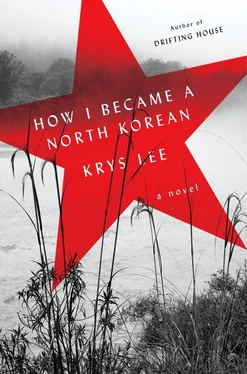Krys Lee
How I Became a North Korean
To those who have crossed
The question for me was always whether that shape we see in our lives was there from the beginning or whether these random events are only called a pattern after the fact. Because otherwise we are nothing.
— Cormac McCarthy, All the Pretty Horses
Home still begins as an image for me. The Pyongyang subway line dug down as deeply as a bunker. The elderly drunk and dancing by the Pothong River to the brass kwaengwari ’s tinsel music. The electric fences circling hundreds of labor camps farther north that we pretended didn’t exist. These images are my home, my prison sentence. But memory is a slippery mirror, a surface that splinters into fragments when I touch it. It moves the way that the poems I used to write changed with each attempt at completion; it haunts me. I find myself looking for clues to the past, repeatedly returning to that mansion floating in light, to our country that the rest of the world calls North Korea.
I’m haunted by what my eomeoni told me. On that last night, she said, no one wanted to be present in the mansion with kilometers of bomb shelter tunnels underneath it. She and my abeoji wore the same smiles as everyone else, the same fur coats and Rolex watches engraved with the name of the Dear Leader, the Great General, the man with dozens of honorific titles. They wore the same Kim family badges over their hearts and, in this way, demonstrated their loyalty to our leaders.
We, the children, were absent. But our parents entered the spacious hall set up for a banquet, saying to one another, “I hear your son will attend Kim Chaek University — you must be so proud of him!” or “I saw your daughter play the cello — what a beauty she is!”
We were safe topics. They knew one another from the same schools, the same committees. Their sons, like me, were exempt from the ten years of required military service and grew up in Pyongyang’s top institutions, and their daughters, like my little dongsaeng, were expected to someday marry their equals. Our eomeoni in silk dresses and hair coiled into buns sat at one side of a long mahogany table, our abeoji in black suits on the other. They looked as if they were enjoying themselves, but everyone was afraid. It could have been any party except for those badges and our Dear Leader at the foot of the table, observing them all.
This was my family’s Pyongyang in 2009. We didn’t know anyone who was exiled to grim mining towns or ground tree bark into their stews in order to fill their stomachs. We shared nothing in common but citizenship with the schoolkids living in the provinces forced to do work in opium fields, or the communities of men roving the country looking for work to seek money that became food. As for me, I lived the life that my abeoji ’s and eomeoni ’s status allowed me; I read and spoke passable English, Russian, and a little Chinese, and expected to attend graduate school overseas. I was twenty-one and assumed my journey would be easy.
In that hall my eomeoni and abeoji must have seemed untouchable as they glided under a chandelier as heavy as a tank. It hurts to conjure up the image of my eomeoni, her face the innocent shape of an egg, her hazel eyes gazing ahead frankly, though she trusted no one. She, a well-known actress, weaved toward my abeoji ’s lover with fluid movements, a walk she had constructed through hundreds of hours of practice. After greeting those she passed, she sat across from a woman with false eyelashes, and, in a tone she reserved for children, said, “You got home rather late last Friday evening, didn’t you?”
In this way, she reminded the woman that there was only one wife and that the wife had generously permitted the husband a tryst with his lover. My eomeoni ’s fierce pride disguised her wounds like a cloak.
My abeoji was a man confident that his decisions were right. He wasn’t too alarmed, and smiled jauntily as he sat beside my eomeoni. He ran the government trading bureau, a powerful position mysterious even to his family; there were always graver issues for him than women. But as his lover flushed and leaned like a sunflower toward her unknowing husband, my abeoji whispered to my eomeoni, “Was this necessary?”
She said, “Does it matter?”
She tilted her chin high, lifting her neckline to hide the subtle physical changes incurred over their marriage arranged by the Great General himself. My abeoji didn’t notice, or care, about such details. But she cared about her unsmudged red lipstick, about protecting her dignity. That last night she upheld her part perfectly until there was no part left to uphold.
To the wife of the number eleven rank in the party who was next to her, she said, “How was your eomeoneem ’s surgery?” then “How was the honey I sent over?” Surrounded by the group of forty guests, fenced in by their limited freedoms, my pragmatic eomeoni maintained her alliances. Minutes later she said to the number seven man in the party across from her, “The plans in your speech last week will serve our country so well.”
As the man blushed and pontificated on trade techniques, my eomeoni ’s chopsticks hovered over slivers of blowfish and tuna still quivering on the plate, part of the latest shipment from the Tokyo Tsukiji fish market flown in on a private jet. My abeoji anticipated the brandy that would be served later; it made him nostalgic for his work trips to Europe, a continent, he had told me, where the whole world was for sale. This was our life.
Before the ruins of the overflowing table and the movable fountain of Chivas Regal were cleared by a dozen attendants, my eomeoni ’s foot nudged my abeoji ’s, her eyes insisting on the glass in front of him. He raised his brandy to the Dear Leader’s health as prompted and said, “To our Great General!”
Finally they dared to look at him.
The Dear Leader lifted a glass to himself, and only then did all the other glasses in the hall rise in succession. “To our Great General!” the bright, anxious mouths said.
Underneath his gray silk Mao suit, maybe the general suffered, too. I wonder if he touched a discolored mole that worried him, or touched his thinning hair teased into a tangle of height when he was weighing his potential successors, checking if he was still intact. But he knew what to rely on when nothing else was left: extravagant rituals of the hand, goose-stepping parades of soldiers, a skyline of monuments. He sank into the chair that hugged his girth, and with one ragged rhythm of his arm held everyone’s attention.
I want the scene to freeze here. I want to prevent the events that my eomeoni told me about on the night we left Pyongyang forever; I want my language of yearning to be more powerful than time, but all I can do is remember. Imagine. Believe the only story I have left of my abeoji .
In the hall so large that their voices echoed, the Dear Leader’s hand rose toward the northernmost wall from him and the wall parted.
The attendants dragged back the red curtains and revealed a stage behind the wall. A glittering disco globe came down from the ceiling and the Joy Brigade began strutting in pink hot pants to a banned American pop song. Everything about the performance, in theory, was banned. The women were too close to the Dear Leader; many would have bleak futures. I would hear about a girl who disappeared to the camps after resisting the Dear Leader’s advances; another, who had idealized a visiting Swiss diplomat and lived with her nostalgia; still another who married a stranger because the Dear Leader commanded the match.
Читать дальше












